Copyright ©2007 PopEntertainment.com. All rights reserved.
Posted:
February 9, 2007.
Though
Miss Potter doesn't seem to be a film that would be interesting to
anyone but say, a Zellweger or McGregor completist, this biopic about the
creator of the world's most enduring and endearing children's character,
Peter Rabbit, is vivid and compelling mostly due to the lived-in and lively
performances of its lead actors. Renee Zellweger, as the children's author
Beatrix Potter, turns her character into a powerful but flawed woman,
pulling the intriguing elements of the British writer/illustrator's
personality out of dry historical record.
Helped in large part by her supporting actors McGregor (as her publisher and
ill-fated fiancé Norman Warne) and Emily Watson (as Norman's sister and Miss
Potter's confidante, Millie), Zellweger establishes Potter as a real person
through a finely etched and subtle performance.
Australian director Chris Noonan's narrative restraint helps his leads too –
as exhibited in his first feature, Babe. Arguably the biggest female
star known for actual acting jobs in Hollywood today, Zellweger has made a
movie quite different from her earlier (and much more controversial)
excursion into playing an Englishwoman in Bridget Jones' Diary.
But while Zellweger is often grouped with Meg Ryan as the reigning
chick-flick queens, Zellweger's Best Supporting Oscar For the complex
historical drama Cold Mountain. Maybe there will be an Oscar buzz for
Miss Potter; there was certainly enough buzzing about at this group
interview with the hardworking girl herself and her co-workers.
Is the underlying theme of this film that an eccentric has to be a
creative artist to prove their self-worth?
Renee Zellweger: I had a lovely conversation with Ewan the other day
about anything that might be strange about myself. I wish I had something to
blame, and then I thought, "Oh, wait, I'm an actress." (laughs.) Now
it all makes sense.
I don't know if one begets the other or which would come first. I have met a
lot of actors and worked with a lot of creative people who need their
medium. They need it. It's their basis and foundation; it's what helps them
cope, how they channel their emotions or their inabilities to deal with
other things. It's the way they communicate, an outlet. It gives them
stability. It gives them purpose. I've met those people. Now, I don't think
I'm one of them – acting's an important creative medium for me but it stops
there. I don't know that it is my first or even only medium; It was more
accidental, but it has become very important to me in my life and I do need
it.
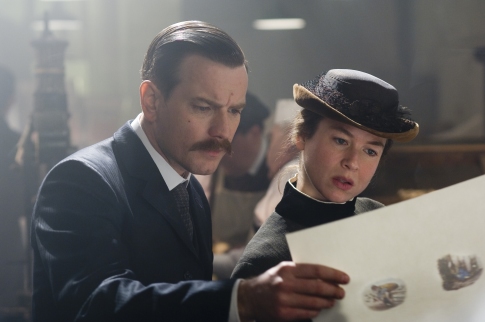 As far as my perceptions about Beatrix Potter go, I imagined that she had
such a rich imagination because she had such an isolated time growing up.
She was living within such rigid parameters set by her mother, expectations
that didn't interest her or didn't come naturally anyway. That was my
perception, that she needed her characters as a creative outlet.
As far as my perceptions about Beatrix Potter go, I imagined that she had
such a rich imagination because she had such an isolated time growing up.
She was living within such rigid parameters set by her mother, expectations
that didn't interest her or didn't come naturally anyway. That was my
perception, that she needed her characters as a creative outlet.
Chris Noonan: I think Beatrix did need her creativity as an outlet
because she was so restricted. She was so restricted in her expression in
other avenues of her life, so restricted in her friendships by her parents.
I think she turned to her writing. In a sense she created her own friends,
and she turned to her writing to create personalities that she could relate
to and maybe even people that could talk back to her.
A lot of this is just conjecture, but we researched her life pretty
thoroughly and filled in a whole lot of gaps; I can't tell you whether we
made the right choices in filling those gaps. Her life is pretty
well-documented, but that only gets you to a certain point without direct
contact with the live person.
Are there people still alive who knew her?
Chris Noonan: There are people alive who knew her, but they're very
old now. So you end up piecing these things together from anecdotes and bits
of writing that you found, and so on. When you start talking about people's
deep psychological motivations, that's a very hard thing to conjure up when
you look into the past. You inevitably invent: You look at the evidence and
you say, 'Now, what would it be that would be motivating her to do this?'
and you invent something that would fulfill that necessity in her life and
you conjecture that that's what it is, and then you assert to the world that
that's what it was. I just hope that we've made the right choices, but
obviously can't guarantee it. (laughs)
Were her books part of your own life?
Renee Zellweger: I knew a couple of her stories. I remember the
images as far back as I can remember anything at all. I remember Peter
Rabbit being there. My mom read the books to my brother and I, but not all
of them. There were other children's books and authors who were more
prominent in our adolescence, [just due to when I grew up].
Chris Noonan: I never read her books when I was a kid. I was aware of
her because of all that crockery with her characters on it? I knew people
who had that crockery, but I didn't have any. So I had a relatively Beatrix-free
childhood, I think. Perhaps that's why I'm so messed up today, you know; I
didn't have that influence as a child. (laughs)
Emily Watson: We had them all. I read them all and loved them all and
actually the copies that we had, had scribbling and writing that had been
done by my aunts and uncles when they were children. They were fairly common
in British households.
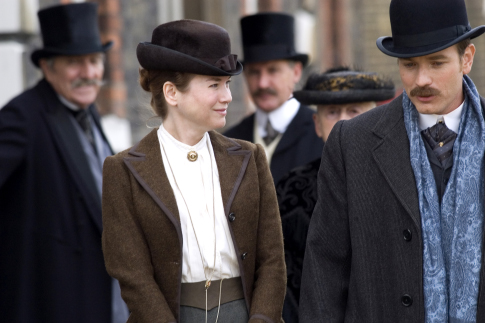 Ewan McGregor: I had them read to me I'm sure. A lot of them... I
don't remember the stories particularly when I was a kid. Like Renee and the
rest of us, I was familiar with her illustrations – the images. I supposed
with Peter Rabbit, the Mr. McGregor reference kind of haunted me and my
brother for a few years [laughs]. Its interesting that our parents
would have had them read to them as well and possibly their parents as well
so. And I read them to my kids.
Ewan McGregor: I had them read to me I'm sure. A lot of them... I
don't remember the stories particularly when I was a kid. Like Renee and the
rest of us, I was familiar with her illustrations – the images. I supposed
with Peter Rabbit, the Mr. McGregor reference kind of haunted me and my
brother for a few years [laughs]. Its interesting that our parents
would have had them read to them as well and possibly their parents as well
so. And I read them to my kids.
Potter wrote traditional and remarkably charming stories. Did you have
any concerns about reaching the modern public at this time?
Chris Noonan: Well, we had a lot of violence and sex in the film, but
we cut that out. [chuckles] You just
make the film that you believe is going to bring some joy to people and that
they'll find entertaining, and you hope that it finds its audience. I have
no idea how big an audience this film will find. I have high hopes for it.
One just trusts that your instincts are good for finding the audience,
because you don't want to make a film that doesn't get across its point of
view. And of course you want to share your artistic enjoyment in making a
film with every audience that watches it, and you hope they enjoy it as
you've enjoyed making it.
There's no way of predicting unless you're dealing in much more predictable
genres than this. If you're making a James Bond film, just the name Bond is
going to guarantee you a big audience, but the name Beatrix Potter doesn't
necessarily because there isn't a proven track record of Beatrix Potter
reaching an audience. So we've just made the film that we loved.
Renee Zellweger: I don't think that people at large are cynics about
art. I think we're cynical about manipulation and things that are
disingenuous. We're cynical about manipulation but I'm not sure that it's
necessarily true that we're cynical about simplicity. If things are honest,
I think that they're relatable.
One of the things we had discussed in the very beginning of this film was
that there's a very fine line, and my character was not a woman who was
overly sentimental. In a couple of scenes, with Chris, we'd discuss it and
I'd say, "Oh, Gosh, please just don't let me corny. Don't let me be corny.
Don't let me be schmaltzy." And he looked at me and he said, "I don't do
schmaltzy." I think that if you're talking about a film that's telling a
human story that people will connect with, whether or not it's simple based
on its being founded in truth, on truthfulness.
Emily, your character Millie comes across in the film as either (or both)
a feminist or lesbian. Was it a challenge to play a character, Millie,
treading a fine line in her relationship with Beatrix?
Emily Watson: I think it’s very hard with us with our understanding
of the way we view sexuality now to impose that on that time period.
Obviously, there are famous known lesbians in and around that time, but I
think probably that Millie has a crush on Beatrix because she's such a
shining star. I think passionate friendship between women were a known
thing. People used to write incredible letters and had passionate
friendships but I don't think that's saying we should be judging
relationships we have or categorizing it. If you turn around to Millie and
said, 'It's a sexual thing. You're a lesbian.' She'd probably have been
horrified but then in another day and age, she might be. I don't know. All
these things are relative I guess.
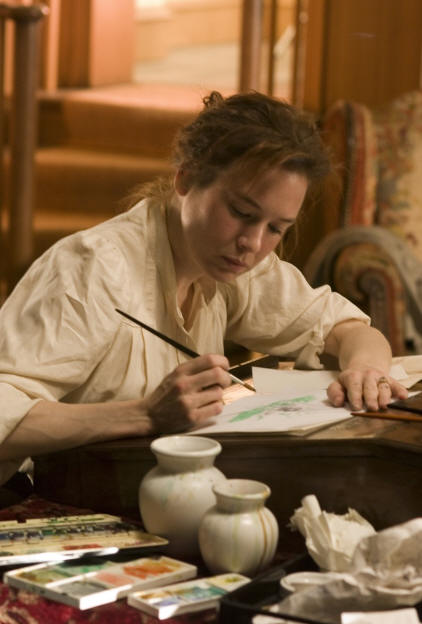 Renee, what made you decide to act as an executive producer? And how far
did you and Chris want to push the fantasy angle with the animated animal
characters appearing throughout the film?
Renee, what made you decide to act as an executive producer? And how far
did you and Chris want to push the fantasy angle with the animated animal
characters appearing throughout the film?
Renee Zellweger: Those two questions are totally interrelated, that's
wonderful. That's where it all began, really. Chris and I--our friendship
began over a conversation in a hotel lobby in Santa Monica, California,
about that very thing. I was curious about the movie, having read the
script, because I didn't believe in how it was being conceptualized on the
page at the time. I was afraid of it. I thought it was gimmicky and kind of
silly, and I wanted to hear what Chris' feelings about it were, and then so
many other questions came up, and I could tell that there was so much to
discussion.
I thought [executive-producing] would be an interesting opportunity to learn
how to collaborate creatively in a different way and to participate on a
more substantial level, instead of just meddling and having opinions, making
it legal to meddle and have opinions. I talked to the producers and I spoke
with Chris and it just seemed like it would work. They said "yes" and it
went from there.
We just discussed things that I wouldn't usually participate in, in terms of
the meetings and making decisions about things. I'd usually just have an
opinion about it and maybe throw it out there, invited or not. I can't help
myself. But in this case, we got together and we sat on many couches, many
late hours in many hotels in different parts of the UK and threw everything
on the table until the sun was coming up sometimes, to try and solve some
problems. It was fantastic. I enjoyed it very, very much.
Chris Noonan: [The animation] in the film was a matter of fine
judgment. The initial drafts of the script had a far more 'sophisticated'
set of animations, much more dominant animations, which had Beatrix's
drawings come to life on the page and then jumping off the page and into the
real world came these 3-D CGI creatures, which would have required us
assigning voices to the creatures.
They were like true fantasy characters. But we all felt, in fact, that the
core of this film is a delicate series of human emotions and human
relationships and that, for one, if we went that far into CGI and animation
it would start making it look like, really, the key people in Beatrix's life
were her animal creations and, that she was a bit crazy, that she imagines a
rabbit jumping off the pages, standing next to her and she has a little
conversation with it. Immediately, you think Beatrix is a little bit loopy.
We were pretty unanimous in feeling that a different approach was needed to
that. But I felt that there was something very valuable in having her
animations exist in their own right in the film because, as an artist,
Beatrix gave expression to her inner life, to her psyche through her art and
through her stories, and that having creatures that we could animate and
even have conversations of a limited nature with her would give us access to
her inner life. She was a very private person who wasn't one to talk about
herself endlessly, by all account.
[The animation] gave us access to her without having to resort to the
clumsier cinematic devices like having a voiceover of Beatrix saying, "I was
feeling very depressed at that" or "This made me very happy." They're clumsy
devices and they tend to produce corny results, and we didn't want that. So
then it was a process of finding the level of that animation and the style
of animation, and I was very strongly of the feeling that we should remain
as faithful to Beatrix's artwork as possible, because they're beautiful
drawings, her drawings, and to get beyond that would seem to be
sacrilegious, in a way, if you're making a film about Beatrix Potter.
So we went on a search for animators and found this wonderful, wonderful
woman, Alyson Hamilton, born and brought up in the Lake District, who was a
devotee of Beatrix Potter, who had been an animator on Roger Rabbit and was
very thoroughly trained in traditional film animation. She didn't do any
computer animation. She had dreadlocks and piercings, not exactly what you'd
think of as a Beatrix Potter devotee. But she was a Beatrix Potter devotee.
She stayed with the film from the early stages, from the time that we were
designing the animation sequences, through to the very tail end and made a
great contribution overall. So I had to deal with that in the editing and
deal with the integration of that very delicately and with some wit, I
think. I wanted to make sure that the little animation set-pieces be
introduced in a witty way rather than as a 'look at me, look at me' way.
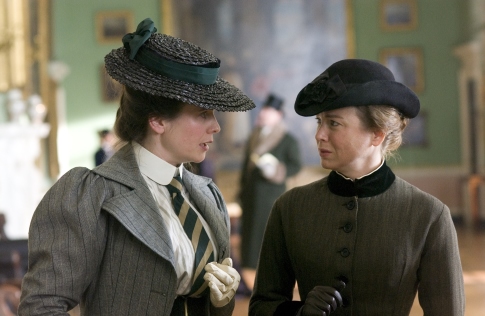 Emily, could you explain Millie's transformation from being a proper
English woman to becoming a very independent woman? Did you take her as
being nice to her friend or really expressing what she felt?
Emily, could you explain Millie's transformation from being a proper
English woman to becoming a very independent woman? Did you take her as
being nice to her friend or really expressing what she felt?
Emily Watson: I think its probably complicated and a bit of both. I
think the lady does protest too much. She's not this lady walking around
declaring her manifesto – "this is who I am and I'm not marrying you" sort
of thing. She does it with great fun and she's good fun and she thinks they
had signed up for their sisterhood and then feels deserted [when Beatrix and
her brother get engaged]. But I think it's all credited to the screenwriter.
Probably inside of her is the most horrible churning of "Oh my God, I've
made such a fool of myself." I think she's afraid of honesty and probably is
lonely and wish life had been different.
It's very difficult for us to imagine all that. Basically she lived with her
parents until they died and then she lived with her brothers and went
visiting for tea and that was it. Had love come her way, there is a real
distinction. We didn't see marriage for love in that period. It would have
been a financial transaction. In the heart of the film it's saying that love
is the most important thing and go for it.
How do Ewan and Renee feel about their re-teaming up since Down With
Love?
Ewan McGregor: Renee and I had a fantastic time making Down With
Love. I think it’s safe to say we are both really proud of it and loved
it deeply, and we had a great deal of fun. But the comedy in the film was
very specifically a kind of '60's type of comedy. I kind of wanted to play
it although it went against the grain, because nobody really plays comedies
like that anymore. It was difficult to learn and if you didn't time it
absolutely perfectly it didn't work.
It was quite hard work and occasionally we would be struggling through a
scene and look at each other and just go, 'Gosh, if we could just play it
straightforward – a scene.' So, we talked about it and we both enjoyed
working with each other very much kept in touch and then Renee called me up
and said, and asked me to read this, which was exactly that. A lot more
free flowing to it. Finding the scene in front of the camera. Its useful and
its great fun to work with Renee again. It was a good time.
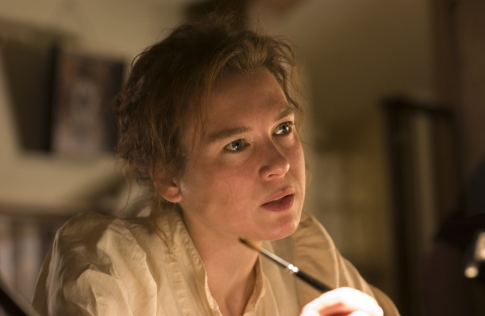 Renee Zellweger: It was hilarious, because you're working in a
different way when you're doing stylized work like that ("Down With Love").
We had no point of reference about whether or not we nailed it, because
there's no way to tell. Cut, moving on. I'd go, "What do you think? Did we
get it?" And he'd say, "I don't know. Do you think we got it?" "I don't
know." (laughs.) We thought how great would it be to just act and see
what happens.
Renee Zellweger: It was hilarious, because you're working in a
different way when you're doing stylized work like that ("Down With Love").
We had no point of reference about whether or not we nailed it, because
there's no way to tell. Cut, moving on. I'd go, "What do you think? Did we
get it?" And he'd say, "I don't know. Do you think we got it?" "I don't
know." (laughs.) We thought how great would it be to just act and see
what happens.
Like Ewan said, we were looking for some things [to do together again], and
then I read this script [for Miss Potter]. Chris and I had been
discussing our wish list of people, and right away, straight away, there was
just no question in my mind. My plan was to beg and grovel shamelessly that
these people would agree to participate – one (Watson) having just had a
baby and not wanting to leave the house, and the other (McGregor) who's
perpetually booked no matter what because he's on everyone's wish list, too.
So I read that scene where Beatrix and Norman are alone for the first time
in her room, and there's so much subtext to that, so much meaning compacted
into the tiniest little gesture. And I knew that Ewan would understand the
delicate nature of that and the vulnerability that was necessary for that.
He has such a gift for communicating those things honestly. It was just such
an enchanting moment in my mind, and so it had to be him.
I talked to Chris and Chris said, "Oh, yes, of course. Of course it has to
be him." And that's when the begging began. Luckily, they came to play. Just
to go further with it, that day on the set, it was mesmerizing, really. He
was focusing on some technical things going on [something about keeping time
to the music], dealing with that and had absolutely no idea, unbeknownst to
him, the six-foot-seven steadicam guy, and Chris and myself and everybody in
the room, we were just enchanted. It was more than I had imagined when I
read the script. So, anyway, there we go.
Besides Beatrix herself, which authors or books have inspired you? And
what did you think of her as a person?
Renee Zellweger: I had this conversation earlier. I don't think she's
weird. I don't think it's strange at all that she speaks to her work when
she's in that creative place in her mind, when she's conjuring this world in
her mind, this imaginary world. It's not strange at all to me. I love her
eccentricities. I think she's brilliant. I think she's completely
complicated in the most wonderful way, and I'd love to have known her.
In terms of my own stuff, that's really interesting. You know, I don't know
specifically. It changes, you know. I pick something up and find it
completely inspiring because it's a different kind of prose. I love Cormac
McCarthy's writing. I love Charles Frazier. You could smell those words. I
mean it's unbelievably rich prose.
I mean, what, do you mean like as a kid or do you mean now? You mean now. I
like African-American writers and I like Southern writers. There are
elements of the subculture that are exquisitely rich, just historically.
There's a musicality to Langston Hughes' work that jumps off the page and it
makes me need a pen. "I need a pen. I need a pen." He's probably my
favorite. And there's just so much emotion. It's kind of like in Latin
cultures. You find this kind of passion for all elements of life. I find
that the same in African-American writers, just this passion for things. "I
need a pen. I need a pen."
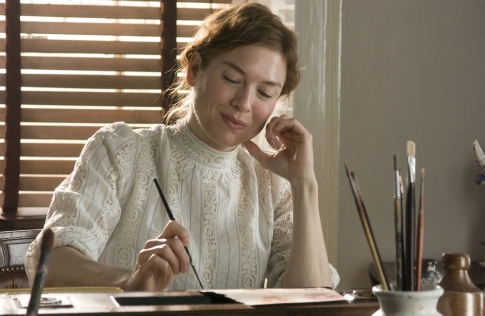 Renee, is it a conscious decision to make chick flicks? Is this the type
of movie your fans expect from you?
Renee, is it a conscious decision to make chick flicks? Is this the type
of movie your fans expect from you?
Renee Zellweger: I don't think this is a chick flick at all. I think
it's far more complex than that. It's not meant to be exclusively female
entertainment. It's an important, important story, and it's a beautiful
story, and I don't think I've met a guy yet who's seen it and didn't connect
to it, or cried. It's just real. It's a human story, the most powerful kind
of story, that tries to take full advantage of the impact this medium can
have in terms of moving a person. Making the audience self-aware in a way,
making you recognize something different, making you question things, or
grow as a person.
I think calling in a "click flick" underestimates it in a terrible way, and
I don't think that's true, that there are people out there who have
expectations of the stuff I do. And, no, it's not a conscious decision, but
I'm curious, and I know that if I feel like I've been there before, I don't
really have much interest in repeating myself and going there again.
Chris Noonan: I don't think it's a chick flick at all. It's a love
story, and in the contemporary mores of Hollywood, if something's got
violence in it and a lot of cursing or whatever it's seen as a male movie,
and if something's got a love affair in it it's seen as a female movie. I
think that's an incredibly limited way of looking at things. I know so many
men who have watched this movie who have been moved to tears by it and have
got a lot out of it. You know, the world has moved on, and I just think
that's a very outdated way of categorizing movies.
Emily Watson: It’s very difficult to ask a question of an artist to
ask them to define themselves by their place in the market. I think it just
doesn't make any sense. You do things, make things you love because you have
to. When a director that you have admired for years calls and asks you to do
it, you say ok, ok, ok. I don't really think about that stuff when you make
choices on compulsion to have an interesting life.
So your next films aren't chick flicks either?
Renee Zellweger: It's a psychological thriller [Case 39]. And
an animated film, Bee Movie with Jerry Seinfeld who is of course,
hilariously funny.
As for you Chris, Babe was a huge international success, but we're
only getting your second film in a decade-plus. Why so long?
Chris Noonan: Well, I sort of sat in a hole, very depressed… No, not
really. It's very hard to follow a success. It puts a lot of pressure on you
and it makes you really want to follow it with something that's equally
successful. I was offered many, many, many scripts in that period and every
time I read one I got more down about what was on offer.
Can you offer an example?
Chris Noonan: No, I'm not going to do that. I'm not going to slander
films. But they all seemed to be very derivative, and that's sort of the
nature of the film industry these days, it seems to me, maybe not so much
right now, but in the last 10 years. It's very easy to get a film up that
you can say, 'It's just like this film that was a success last year,' or
'It's a cross between these two films that were both successes last year,'
than it is raising the money for a movie that is completely original and no
one has ever seen anything like it before. That's the kind of thing I'm
interested in more than I'm interested in remakes or rehashes of already
made movies.
I found it very hard to find anything that I was interested in. I developed
a couple of movies. I co-produced a movie in Australia for a first-time
director and I kept looking and kept depressing myself by reading scripts.
And this was the… I can't say it's the first script I read in that process
that really moved me, but it was one of the first scripts I read that moved
me because it seemed to be genuine. The emotions of the film seemed to be
genuine. It seemed not to be a manipulative emotional film. It seemed not to
just be pushing buttons. It seemed to be much more about the reality of life
and I really, well, I shed a tear over the script and was immediately
interested in it and pursued it from there.
How long did it take from there?
Chris Noonan: I guess that would have been about three years ago that
I first read the script. A lot of time passes with most films, and this was
just the latter stages of the development of the film. It had been developed
already for about five or six year by one of its producers and its writer.
So one has to be very patient in developing films.
The issue of self worth. This is also a movie about people emerging into
their true selves. Did you identify with your characters in that way?
Ewan McGregor: Wow. I think there is something interesting about that
when [Norman] meets Beatrix; his brother is upset that they are going to
publish the book and immediately she says, "Well it must be like this, this
and this." And, I imagine she must have been a tough cookie to deal with.
So, when she meets Norman, he's so nervous about being a publisher that he
immediately meets her demands or enthusiasm with goals of his own, because
they seemed to be a perfect match in terms of the passion towards her work.
I don't know that it was about. I don't get the sense he was trying to prove
himself.
Chris Noonan: I'm going to be equally frustrating for you, because I
don't think I have approached this script from the point of view of
intellectual analysis of themes and that kind of thing. I think it's much
more an intuitive process for me, and so I haven't got a ready answer for
your question. I think that's the critic's job to look at the film and…
you're doing the critics job by pointing out to us that this is a theme in
our movie. It's not a theme that's consciously driven me through the movie,
but it's something that I find very interesting, that it's there, and I
think we all, as creative people, we instinctively arrive at decision as to
how we make a story play.
Often the threads of those decisions can be brought together and a thematic
line can be seen in them, but [it can] be one that wasn't actually intended.
It wasn't one that we set out to do. But that's sort of the magic of the
creative process anyway.
Renee Zellweger: In what respect [did we show how she evolved]? Well,
from the inside, when you're trying to make decisions about how to maybe
show the evolution of a character throughout their life, you make creative
choices about how to show that, on that day or in the way they dress,
they're mannerisms, how they change, how they carry themselves a little bit
differently, things like that. It's subtle and it's truthful in terms of
making the choices for the moment. There are a few of them you have to plan
in advance, like wardrobe changes for example.
For Beatrix, I spoke with Anthony [Powell, the costume designer] and we
decided that when she was under her mother's influence she was going to be
more uptight and more rigid and more formal. And as she begins to find her
own legs, well, we're going to show that her clothes get a little bit less
tailored, and she's going to grow a bit. You know, she's going to spread
out. You know, with the landscape she's going to take up a little bit more
space, not only in her life but to find her voice, and so her clothes should
be the same to reflect it. There are subtle things like that, if you want to
draw a parallel with the Beatrix and Norman characters.
There's a definite common bond there between the two of them, who kind of
lived at home, kind of were the caretakers, kind of didn't have massive
social existences, and they have this common denominator in this creative
effort that they shared. That was part of their affection. Ewan and I
discussed it as being this thing that they shared in terms of finding their
own. It was more subtle than that. It was subconscious. It was not something
that either one of them was consciously aware of. Norman and Beatrix just
started to collaborate and liked it.
One thing we find out about through this film is Beatrix Potter's
environmental importance in
England,
how big a part she played in farmland preservation…
Renee Zellweger: I was gonna to skip that and go straight to talking
about my sex life! [laughs] My mother would be proud. OK, let's see,
what can I tell you about her environmental contributions? I was very
surprised. I knew nothing about it. And just recently I was reading about
the things that she did with the Girl Scouts, in terms of accommodating
them, teaching them and helping them learn how to survive on their own in
the wild, all sorts of things. I had no idea about the land. I wasn't aware
of the magnitude of the contribution that she had made in that respect, what
was it, 4000-something acres she started to collect? She was a founding
member of the National Trust...
Chris Noonan: A lot of that land was working farms, so it's not
virgin land or virgin forest or anything like that. It's much more that she
fell in love with the land as it was in the Lake District, and just didn't
want to see tourism develop there and that kind of thing. So she wanted to
be part of this organization to preserve it.
Renee Zellweger: She referenced feeling the encroachment. She
definitely envisioned that environmental destruction of the landscape was
going to happen inevitably if she didn't participate in something to prevent
that.
Emily Watson: I think for Americans to appreciate how important it is
in the UK, if you visit there now, there are places with natural beauty,
there are so many people there, and it's so small and everyone is so
grateful for the small bit of preservation that has been done. It they had
eaten it up, there would have been no wilderness now but for Americans it's
a different thing because it's such a huge country but it is so important
for the UK.
Renee Zellweger: It does feel encapsulated. When you go there, it
feels encapsulated, like there's a point of entry and a point of exit.
Absolutely. When you get to the preserved land, or the English countryside
in quotations, I didn't get that feeling, that endless sort of ongoing
wilderness before you that you might get in Northwestern, er, Northeastern,
uh, Midwestern [laughs] America today. I feel it here, too, so I can
imagine, because England is quite small and precious.
Ewan McGregor: That's why we invented the Midge in Scotland, which is
a tiny mosquito 'cause that's why we're not up there [laughs].
So is there a statue of Beatrix Potter in
England?
Is she a national heroine?
Ewan McGregor: She's on the back of the 25 pound note [laughs].
CLICK HERE TO SEE WHAT EWAN
McGREGOR HAD TO SAY TO US IN 2011!
Email
us Let us know what you
think.
Features
Return to the features page.







